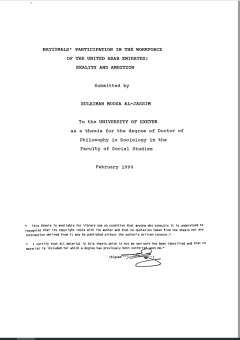This thesis assesses the realities of human resource development and employment and education policies in the UAE. It shows the need to adjust policies in manpower, education, the media and information agencies – and by both Federal and Emirate governments. Improved manpower policies must be part of a more rational approach to national planning: one that determines a co-ordinated and unified economic path for the Emirates. Development in the UAE involves radical modifications to society, culture and economy, in response to the pressing concerns and aspirations brought about by the domestic investment of oil revenues. Oil-based development has been largely based on an immigrant workforce created by major imports of non-national workers. Nationals meet only 10% of total manpower requirements. Their perceptions of education and work have to be radically reviewed to make them relevant to future development requirements. Reliance on non-national labour is not consistent with either the political or economic independence of the UAE. Traditional customs and values are considered in relation to work and education policy. Substitution of nationals for non-nationals, the place of females in the workforce, popular perceptions of work and the links between education, the workforce and national development requirements are reviewed. A questionnaire survey of UAE national employees and secondary and university students (male and female) explores nationals’ perceptions of work participation and vocational training. Survey results are supplemented by extensive use of official UAE data sources. The results point to the need for a redirection of labour policy. Present labour policies, popular expectations about work and rewards (especially among graduates), the misfit between educational goals and national labour requirements, and the under-utilisation of public sector and female labour, all contribute to a diminished national contribution to development. The national workforce is found disproportionately in the public sector, aggravating shortages of nationals in the oil, industrial agricultural and fisheries sectors. Extra employment of non-nationals, often followed by their dependarits, increases social infrastructural requirements. Public bureaucracies are grossly overstaffed. Reductions could be made without loss of service efficiency. Corrections must come from adjustments to official employment policies and from keener inducements to nationals to enter the private sector and “blue collar” occupations.





